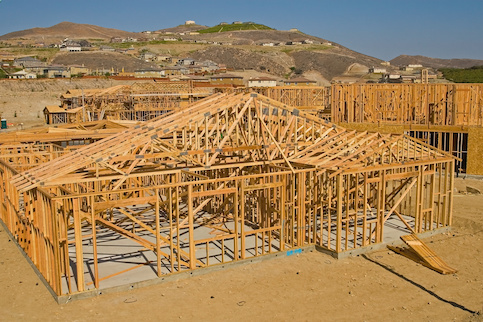Effective Nov. 16, 2025, both Fannie Mae and Freddie Mac no longer require a specific minimum credit score for conventional loan approval. Instead, loan decisions will be based on an analysis of overall credit risk factors.
Sticker shock is a common experience for home buyers. If you find yourself looking at homes that cost more than you can borrow with a conforming conventional loan, you’re in the market for a jumbo mortgage. If you’re not sure what a jumbo loan is or how to get one, you’re reading the right article.
Key Takeaways:
- A jumbo loan is a mortgage that exceeds the maximum loan amount for conforming loans.
- If you’re looking to buy a home that costs more than the conforming loan limit, you may need a jumbo loan.
- Because jumbo loans are larger and pose more risk to the lender, they have stricter eligibility requirements and higher closing costs.
Jumbo Mortgages Explained
A jumbo mortgage is a type of home loan that exceeds the borrowing limit on conforming loans. That means jumbo loans can play by their own rules because they aren’t subject to governmental regulation.
When private lenders offer these loans, they take all the risk. Jumbo loans cost slightly more than conforming loans and lack the consumer protections conforming lenders must provide.
Jumbo loans are typical for borrowers who can afford to buy a more expensive home or are for borrowers buying in areas where homes are worth more than the conforming loan limit.
Exceeds Conforming Loan Limits
Jumbo loans exceed the conforming loan limits, which are set each year by the Federal Housing Finance Agency. When eligible buyers borrow less than the conforming loan limit, the lender can sell the loan to Fannie Mae or Freddie Mac. The lender transfers the risk of making the loan to these government-sponsored enterprises and can use the proceeds from the sale to make additional loans.
Jumbo loans exceed the conforming loan limit and cannot be sold to Fannie or Freddie. That means the lender keeps the loan and accepts the risk of default.
The FHFA sets a baseline conforming loan limit for homes with one to four units. This limit applies to about 95% of U.S. counties. A high-cost area limit applies in counties with higher home values as well as in Alaska, Hawaii, Guam and the U.S. Virgin Islands. You can use this site to see which limit applies in specific counties.
Here’s a rundown of the conforming loan limits for 2025.
2025 Conforming Loan Limits
| Number of Units | Baseline Loan Limit | High-Cost Area Limit |
|---|---|---|
| 1 | $806,500 | $1,209,750 |
| 2 | $1,032,650 | $1,548,975 |
| 3 | $1,248,150 | $1,872,225 |
| 4 | $1,551,250 | $2,326,875 |
How Much Can You Borrow?
You can borrow as much as your lender determines you can afford, which will depend on your credit score, debt-to-income ratio and savings.
Interest Rate Type
Jumbo loans come with either a fixed or adjustable interest rate. A fixed rate is set when you take out the loan and never changes, making your payments predictable to the end. An adjustable-rate mortgage typically has a lower fixed introductory rate that won’t change for a specific number of years. After that rate expires, your interest rate will adjust according to market conditions, usually once a year. Most ARMs limit how much your rate can increase in any one year and establish an overall maximum rate.
Interest Rates
Expect jumbo loans to have slightly higher interest rates than conforming loans to offset the increased risk to the lender. Also, borrowers who can afford a jumbo loan typically have sound finances.
Loan Term
Jumbo loans have similar loan terms to conventional loans. Since they are for a larger amount, jumbo loans are commonly issued with 15- or 30-year loan terms, though custom terms are available depending on the lender.
Types Of Homes You Can Buy
You can buy any type of home you like with a jumbo loan, including second homes, vacation homes or investment properties.
Tax Implications
One of the benefits of owning a home is the mortgage interest deduction. You can deduct interest only on the first $750,000 of your mortgage debt if you’re single or married filing jointly and $375,000 if you’re married filing separately.
What’s Your Goal?
Buy A Home
Discover mortgage options that fit your unique financial needs.

Refinance
Refinance your mortgage to have more money for what matters.
Tap Into Equity
Use your home’s equity and unlock cash to achieve your goals.
What Are Typical Jumbo Loan Requirements?
There are no standard requirements for a jumbo loan, but here is what you can generally expect lenders want to see from applicants.
Debt-To-Income Ratio
Jumbo loan DTI requirements call for a maximum ratio of 45%, although borrowers with DTI ratio of 36% or lower may get better terms and rates.
Lenders require proof of income for conventional and jumbo loans. A borrower’s income must be sufficient to cover their monthly debt obligations plus the new loan payment. While conventional loans require certain documents as proof of income, jumbo loans may require more documentation than a more traditional loan.
Minimum Down Payment
Down payment requirements for conventional loans range from 3% to 5% for qualified borrowers. However, jumbo loans require larger down payments of at least 10%. Some lenders may require even higher down payments for exceptionally large loan amounts.
Credit Score
Jumbo loans typically require a credit score of at least 700, which is higher than the 620 score usually required for a conforming loan.
Cash Reserves
Lenders require jumbo loan borrowers to have up to 18 months of income in reserve to qualify. This helps ensure borrowers can afford their loan and housing costs in times of hardship.
Closing Costs
Closing costs for conventional loans can vary but are often between 3% and 6% of the purchase price. Jumbo loans closing costs are in the same range, but because the loan amounts are larger, the closing costs are higher. In general, buying a more expensive home will come with proportionately higher closing costs – and that can make a big difference in what you pay overall. For example, a $900,000 mortgage loan could have closing costs between $27,000 and $54,000.
Jumbo Loans Vs. Conventional Loans
| Loan Type | Jumbo Loan | Conventional Loan |
|---|---|---|
| Maximum DTI | Up to 45% | Up to 50% |
| Minimum Down Payment | 10% to 20% | 3% to 5% |
| Cash Reserves | Up to 18 months | Required only under certain circumstances |
| Closing Costs | 3% to 6% of the purchase price | 3% to 6% of the purchase price |
History Of Jumbo Loans
As housing prices have increased – sometimes dramatically – jumbo loans have necessarily become a more common financing option. As the conforming loan limit increases each year, so does the minimum amount that qualifies as a jumbo loan. For example, in response to the 2008 housing crisis, Congress raised the limit on FHA loans from $417,000 to $730,000. Because jumbo loans often come with higher interest rates, this helped make homeownership more affordable for borrowers buying a home with a purchase price above $417,000.
Ready To Become A Homeowner?
Get matched with a lender that can help you find the right mortgage.
Pros And Cons Of Jumbo Loans
Jumbo loans come with certain benefits and drawbacks. Here’s a rundown of the pros and cons of jumbo loans.
Pros And Cons Of Jumbo Loans
| Pros | Cons |
|---|---|
| You can buy a more expensive home. | Stricter eligibility requirements. |
| You don’t have to take out multiple loans to cover the purchase price. | Higher closing costs. |
| Larger down payment requirement. | |
| Can come with higher interest rates. | |
| Higher credit score requirement. |
How Do You Apply For A Jumbo Loan?
Applying for a jumbo loan is like applying for a conventional loan. Still, there are some extra considerations to keep in mind. Here are the steps to take to get a jumbo loan.
- Determine how much you can afford to borrow. You can use our mortgage calculator to see how your loan amount, interest rate, and down payment will affect how much you’ll owe each month.
- Gather your financial documents. Jumbo loans have stricter eligibility requirements, so you’ll want to gather the documents needed to show you can afford your loan.
- Compare offers from multiple lenders. Not every lender offers jumbo loans and those that do set their own terms and interest rates. Be sure to compare several loan estimates from several different lenders to make sure you’re getting the best deal on your jumbo loan.
- Find a house and submit an offer. The fun part is browsing listings and touring properties in your price range until you find the home you want to buy. Your real estate agent can help you put together a fair offer.
- Close on the deal. Once the seller accepts your offer, you’ll sign a purchase and sale agreement. The lender will underwrite your loan application to verify your finances. Once you’re approved for the loan and a home appraisal confirms the purchase price is fair, you can close the home.
Take The First Step To Buying A Home
Find a lender that will work with your unique financial situation.
Can You Buy A High-Value Home Without A Jumbo Loan?
If a borrower’s loan amount exceeds FHFA loan limits, they can take out a piggyback loan. This means taking out two mortgages at once to afford the home purchase. Usually, the second loan is for up to 10% of the home’s value financed as a home equity line of credit. As a result, the first loan is 80% of the purchase price, and the borrower supplies the remaining 10% as the down payment.
FAQ
Here are answers to common questions about jumbo loans.
The Bottom Line
A jumbo mortgage accommodates home purchases that surpass the FHFA’s conforming loan limits. While conforming loans adhere to these limits and follow governmental regulations, jumbo loans operate outside those boundaries, allowing lenders to take on more risk without government backing. Jumbo mortgages are essential for properties in high-cost areas or those exceeding average prices. These loans require a larger down payment and more rigorous income proof. Applying for one is like applying for a conventional loan, but scrutiny and requirements are higher.
More From Quicken Loans:
Ashley Kilroy contributed to the reporting of this article.

Rory Arnold
Rory Arnold is a Los Angeles-based writer who has contributed to a variety of publications, including Quicken Loans, LowerMyBills, Ranker, Earth.com and JerseyDigs. He has also been quoted in The Atlantic. Rory received his Bachelor of Science in Media, Culture and Communication from New York University. He also completed the SoFi/Coursera Fundamentals of Personal Finance Specialization consisting of five courses: Introduction to Personal Finance, Saving Money for the Future, Managing Debt, Fundamentals of Investing, and Risk Management in Personal Finance.












